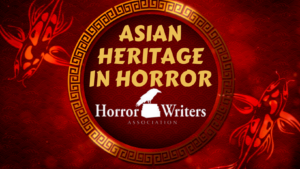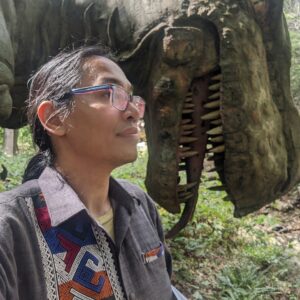Asian Heritage in Horror: Interview with Bryan Thao Worra


Photo Credit: Author self-portrait, 2022
Bryan Thao Worra is the author of 10+ books. One of the first Lao Americans to arrive in the US in 1973, and the first Lao American to hold a professional membership in the Horror Writers Association. He holds over 20 national and international awards for his writing and community leadership. He served as the president of the International Science Fiction and Fantasy Poetry Association from 2016-2022. He has presented at the Smithsonian and the 2012 London Summer Games on the role of the imagination and memory in creative writing as a poet and prose writer, focusing on the creative journeys of Southeast Asians, and will discuss his work at the Library of Congress on May 2nd.
@Bthaoworra Instagram
@Thaoworra Twitter
What inspired you to start writing?
These days I think a poet has a thousand beginnings. Sometimes I trace it back to an old encyclopedia with gorgons and dinosaurs, another, a 3rd-grade role-playing game almost no one remembers. Others it feels like an unrequited crush on a classmate, a fortune teller’s prediction about me shared to my grandmother, a ghost in an attic, or just the absence of seeing stories like my own in the news, in movies and novels, and especially poetry. Each moment was liberating in its own way.
What was it about the horror genre that drew you to it?
In the 1980s the horror genre spoke to me as the only form where I consistently saw others with roots in Asia depicted in all of the possible roles: Protagonists, antagonists, monsters and victims alike were all often shown on screen or on the page in horror. I admired that in contrast to many other forms of art in which Asian and Pacific Islander characters seemed one-dimensional, tacked-on narrative furniture.
A case in point would be the M.A.S.H. media set in the Korean War, or Vietnam War movies such as Apocalypse Now and Full Metal Jacket where, more often than not, Asians were voiceless, faceless targets or things to sleep with or pity as victims without agency. But in horror, whether Godzilla or Big Trouble in Little China, among so many others, I saw a range of characters that was eye-opening.
Do you make a conscious effort to include Asian and/or Pacific Islander characters and themes in your writing and if so, what do you want to portray?
When I look back at my initial early work, I think I did. I really made an effort to spell it out if the different characters in my stories were clearly intended to be Asian and/or Pacific Islanders and from particular cultures such as Japan and Laos, Hmong or Thai, Filipino, etc. etc. etc.
Then I realized that for all of that conscious effort of insertion, most of my readers had already assumed that was the default ethnicity I was writing from.
It took a little while working with editors to make it clear over time that I was ALWAYS going to incorporate language that drew on my heritage and traditions but I wasn’t going to be “The Explainer of All Things” in every story and poem or spoon-feed my work to readers or italicize particular vocabulary items to make it clear we were switching into the “Asian” portion of the text.
If we don’t do that for tacos or sombreros, caucus or rendezvous, then readers will just have to figure it out what I mean by sabaidee or sticky rice or Lao New Year.
You can tell a Sex in the City story without getting a complete history of Washington crossing the Potomac, or the significance of Sadie Hawkins Day, so I became comfortable telling stories and writing poems for an international audience that were essentially in media res, and decentered “whiteness” as an imagined audience I was most concerned about. I was already writing in English, which many colonized cultures were also reading and writing in, so that felt like enough of a compromise already.
Now the question to me is, who are the types of characters I feel the body of Lao literature is presently missing to meet our various narrative needs, in our own words and in our own voices? Who also breaks with some of our traditions to open up new possibilities, especially in horror. Hence, longer poems were written like “The Dream Highway of Ms. Mannivongsa,” where I didn’t feel we had a lot of precedent for a Lovecraftian Lao “heroine” wandering through a mythic America during her dreams during the early refugee resettlement years in the US.
Laos traces its roots back over 700 years, but we didn’t quite have a figure like this in our poems and ghost stories. We had a trickster figure like Anansi in the character of Xieng Mieng, a more conventional hero in epics like Phra Lak Phra Lam, Kalaket, or Sinxay, but there’s still room for new characters who might well one day figure in the global imagination like Lady Macbeth, Walter Mitty, Don Quixote, or Sherlock Holmes.
So, TLDR, that’s how I often start approaching various characters in my works: What’s missing, or who would our counterparts be, and what are ways in which their heritage is expressed in their decisions and considerations that wouldn’t work for someone without that background? Even something as simple as taking your shoes off in the house.
What has writing horror taught you about the world and yourself?
I think that it’s been a fascinating exploration of human psychology and what we assume are universal concerns, but I find that there are fewer absolutes than we often think across cultures and within them. I’ve learned a lot about our different relationships to pain, or what gives us delight, what we chase after, or fear getting chased by, the dread of things that will be left incomplete, or the ways we might get killed. Especially once we find ourselves in distant lands from where our families might consider home, you start to develop an appreciation for different ways of thinking on things.
I’m always looking forward to challenging our fears, what deserves to be feared, what’s an irrational fear. What’s an escapable fear versus the inescapable, especially across the possibility of multiple lives and iterations as an individual and a culture, and within many traditions, American, Lao, Asian, and many others that intersect.
How have you seen the horror genre change over the years? And how do you think it will continue to evolve? How do you feel the Asian and/or Pacific Islander communities have been represented thus far in the genre and what hopes do you have for representation in the genre going forward?
I think we still have a long way to go in US and European horror to get past certain stereotypes of Asian women and elder male protagonists, but we’ve made progress with fewer Asian antagonists in the vein of Fu Manchu or generic Yakuza and Triad bosses. Enduring Asian American monsters is still a bit of a terra incognita, however, and with other 60+ Asian cultures in the US, I think this is such an intriguing opportunity for everyone, whether we take on traditional monsters such as the jiangshi or phi and weretigers, or if we see someone try to create an all-new type of monster suitable for our times.
Who are some of your favorite Asian and/or Pacific Islander characters in horror?
I often think about characters such as Glenn in the Walking Dead, or the character of Juno in the film the Descent, who I often saw as the protagonist trapped underground with the widow of man she had an affair with. Of course, the many different kaiju always have a spot in my heart.
But I most often look forward to seeing different takes on the character of Nang Nak in Southeast Asian horror stories because you never quite know how a different writer is going to take on the lead character of the ghost story. Sometimes it’s just straight horror, other times it’s a more sympathetic take. Others still, it’s operatic or a soap opera. I appreciate an older story that can still have so many variations when we think we know it. It’s similar to the way you’d think we’ve told Dracula stories to death but there’s still something interesting to look at in the hands of an able writer in poetry, prose, film, video games, and so many other forms of media.
Who are some Asian and/or Pacific Islander horror authors you recommend our audience check out?
I certainly recommend Cassandra Khaw, S.P. Somtow, Christina Sng, Lee Murray, and Kristine Ong Muslim, in particular overseas. In the US, I’ve been watching the work of Angela Yuriko Smith, Rena Mason, Marjorie Liu, and several others who are blazing some significant trails.
What is one piece of advice you would give horror authors today?
Our culture is not a liability, and we don’t have to be afraid of engaging with it in our literature. But the nature of horror is also inherently transgressive, and you have to be able to get into a mindset of challenging those same traditions. What happens when we put our values and customs in a space where they might not be helpful, or where your character’s survival might require compromising them?
And to the Asian and/or Pacific Islander writers out there who are just getting started, what advice would you give them?
Reading between the lines is just as important as the lines themselves. But seek a vibrant and diverse community of fellow readers and writers you love to share things with. The sooner you find those, and feel happy taking both critiques and praise from them, it will often accelerate your productivity and willingness to take risks within your writing, knowing that your initial stories and poems will not be your last.



